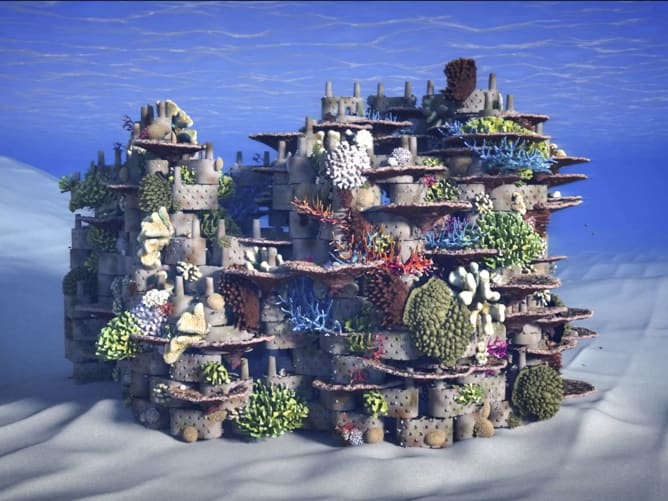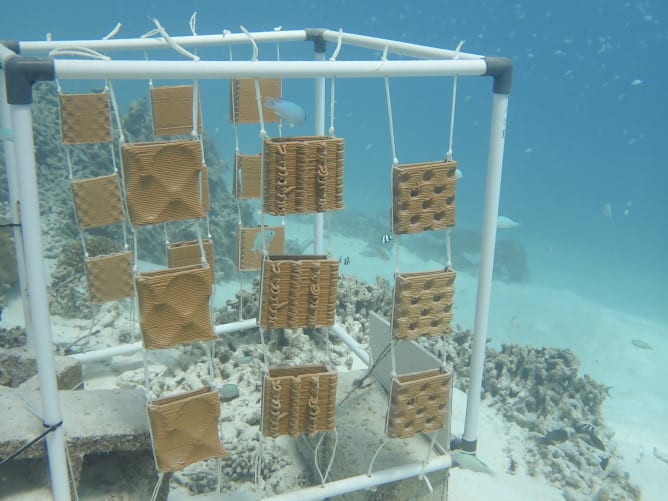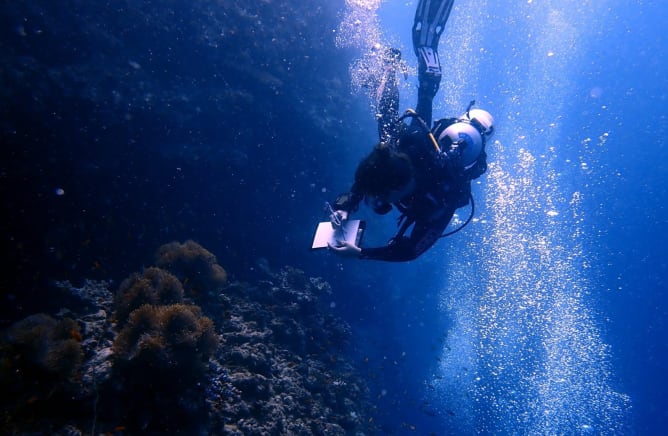Our action plan
WE ARE a dedicated team of ocean lovers and biodiversity nerds, scientists, designers, and artists. Founded and led by Marie Griesmar and Ulrike Pfreundt, rrreefs is supported by amazing people inside and outside Switzerland, united by one mission:
We want a healthy ocean full of life! We want coral reefs to survive!
THAT IS WHY we are rebuilding dead coral reefs with innovative 3D-printed structures. With our interdisciplinary team, we are convinced we can do it. How? Rigorous dedication, Radiating passion, Resourceful implementation - just RRReefs.
YOUR CONTRIBUTION will provide direct support to building new homes for corals and reef animals, while also contributing to the development of robust research methodologies that ensure each reef installation is more effective than the previous one. With your pledge, you can help new life flourish in the ocean NOW.
OUR FIRST REEF PROTOTYPE is ready to go underwater. It is a modular brick system, 3D printed from clay. It’s inner and outer structure is specifically designed to provide habitat for corals and a diversity of other reef animals.
Here is what we will do with 60.000 CHF.
- build our first pilot reef in Colombia in summer 2021, which will
- create new habitat for around 20,000 small reef animals and 500 corals
- organize a workshop on «Rebuilding Coral Reefs» together with our local partners Corales de Paz (get your spot now!)
- document the ecological value and restorative success of our pilot reef, for at least 2 years
- demonstrate that it is easy to build and customize
- share everything with you and the world!
Little teaser: You will see the first fish move in after just a few days!
With 150.000 CHF or more, you will help our organization really kick off. Our long-term strategy is bold and ambitious! Here are our plans:
- rebuild hundreds of kilometers of reefs along devastated coastlines
- bring back abundant, wild biodiversity
- restore coastal protection
- work with local communities to increase socio-ecological resilience
For this, we have to create first full-time positions and provide start-up funding for scientific research. By constantly improving the structure, technology and material for our reefs, we will bring construction time and costs down without compromising on the ecological value of our reefs.
Why should we rebuild coral reefs at all …
… if they are dying from climate change?
The warming ocean puts extreme pressure on coral reefs. Worldwide coral bleaching has already killed about half the corals. Clearly, if nobody would do anything, we would witness most coral reefs dying in our lifetimes. The resulting extinction of a quarter of all marine animal species puts the health of the whole ocean at stake. FOR US, that is not an option.
We want to make sure that coral reefs survive long enough for humanity to get climate change under control. To do this, we can help corals sexually reproduce and maintain a high genetic diversity. This gives them a chance to adapt naturally. When corals reproduce, their larvae float with the ocean currents for a few weeks, and then have to settle down on a suitable structure to start growing. Dying reefs are losing this essential structure. They are breaking down, so young corals cannot survive and many reef animals lose their habitat.
We are rebuilding the reef structure, with three immediate aims.
- to give coral larvae space to settle, grow, and survive
- to provide new habitat for diverse reef life
- to restore coastal protection.
This allows animal populations to regenerate while we solve climate change, helps local communities, and protects values along the coasts.
Our key to success
Our rrreef system is unique because of the integration of four crucial elements:
- Science & Technology
- Art
- Sustainable Materials
- Modularity & Practicality
Earlier pioneering artificial reef designs have shown that rebuilding a reef is a complicated endeavor, and often fails due to unsuitable material, too little structural complexity, or because the design was simply not integrating a holistic view of the ecosytem. By incorporating scientific knowledge and new research into our designs, we make sure that we do not just create aesthetic underwater structures, but new reefs with a real and measurable benefit to the marine ecosystem. For research and reef construction, we use the latest digital fabrication methods - 3D printing and robotic construction - which enable faster prototyping and more complex structures.
We accompany each new reef installation by scientific investigations of its restoration efficiency, to validate the scalability and viability of our prototypes. Through our connection with the Swiss Federal Institute of Technology (ETH) Zürich, the simulation specialists from CADFEM Suisse, and the Zürich University of the Arts, we have access to cutting-edge technology for 3D printing with different sustainable materials, robotic construction methods, and high-end simulation and experimentation systems. Our partnerships with the non-profit Corales de Paz, the MaRHE Center, and the Grupo Puntacana Foundation ensures we can conduct field experiments in different parts of the world, with excellent local support. A big Thank you to our partners!
Now, all we really need is financial support to really get going!
WE WANT YOU to be a part of our journey. WE WANT TO SHARE OUR PASSION for the ocean and our love for the reefs, let you know how the project evolves, and celebrate the settlement of our first baby corals together. Every one of you will bring us a step forward in our common quest for a healthy ocean with thriving coral reefs.












